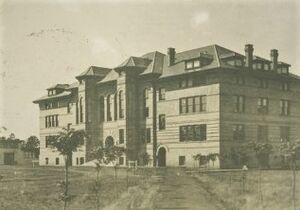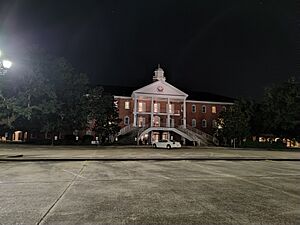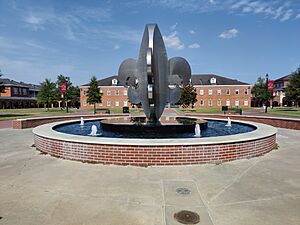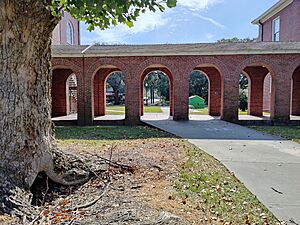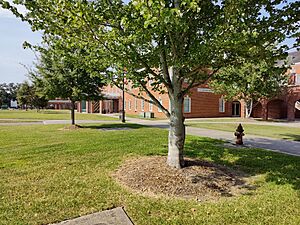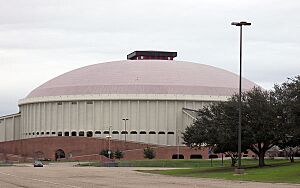University of Louisiana at Lafayette facts for kids
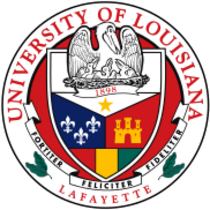 |
|
|
Former name
|
Southwestern Louisiana Industrial Institute (1898–1920) Southwestern Louisiana Institute of Liberal and Technical Learning (1921–1959) University of Southwestern Louisiana (1960–1998) |
|---|---|
| Motto | Fortiter, Feliciter, Fideliter (Latin) |
|
Motto in English
|
Boldly, Happily, Faithfully |
| Type | Public research university |
| Established | July 14, 1898 |
|
Parent institution
|
University of Louisiana System |
| Accreditation | SACS |
|
Academic affiliations
|
|
| Endowment | $232 million (2021) |
| President | Jaimie L. Hebert (interim) |
|
Academic staff
|
776 |
| Students | 19,056 (fall 2023) |
| Undergraduates | 13,179 (fall 2023) |
| Postgraduates | 2,166 (fall 2023) |
| Location |
,
,
United States
30°12′44″N 92°01′12″W / 30.21222°N 92.02000°W |
| Campus | Urban Main Campus, 145 acres (0.59 km2) University Commons, 391 acres (1.58 km2) Misc acreage, 764 acres (3.09 km2) Total: 1,300 acres (5.3 km2) |
| Newspaper | The Vermilion |
| Colors | Vermilion white |
| Nickname | Ragin' Cajuns |
|
Sporting affiliations
|
NCAA Division I FBS – Sun Belt |
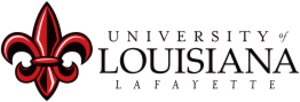 |
|
The University of Louisiana at Lafayette (often called UL Lafayette or UL) is a large public university in Lafayette, Louisiana. It is known for its strong focus on research. This university has the most students in the nine-campus University of Louisiana System. It is also the second-largest university in Louisiana overall.
UL Lafayette started in 1898 as a school for industrial skills. Over time, it grew into a full university. It offers special degrees like a Ph.D. in French studies and a master's in informatics. The university has achieved many important things in computer science, engineering, and architecture. It also has a unique College of the Arts.
Contents
History of UL Lafayette
The University of Louisiana at Lafayette began on July 14, 1898. It was first called the Southwestern Louisiana Industrial Institute (SLII). The state of Louisiana created the school. Many towns wanted the new school. Lafayette was chosen because it offered land and money.
The first president was Edwin Lewis Stephens. The school opened its doors on September 18, 1901. The first buildings were Martin Hall and Foster Hall. About 100 students and 8 teachers were part of the first class. By 1903, 18 students were in the first graduating class.
In 1920, the school started offering four-year degrees. The next year, in 1921, its name changed to Southwestern Louisiana Institute of Liberal and Technical Learning (SLI). In 1960, the school was renamed the University of Southwestern Louisiana (USL). Finally, in 1999, it became the University of Louisiana at Lafayette.
Exploring the Campus
The campus of the University of Louisiana at Lafayette is in Lafayette, Louisiana. This area is part of the Acadiana region.
Main Campus Area
The main campus started with only 25 acres. It has grown a lot over the years. Today, it covers about 145 acres. This area includes many important buildings and spots. Some of these are Martin Hall, Girard Hall, and the Quadrangle. Two of the oldest buildings, Foster Hall (1902) and DeClouet Hall (1905), are also here.
The Quadrangle: Heart of the University
The Quadrangle, or "the Quad," is like the center of the university. It was updated in 2015 with new paths and a fountain. The fountain has a 15-foot tall Fleur de Lis sculpture. Many important buildings surround the Quad.
- Martin Hall: This was the first building on campus, built in 1901. It is where the university president works.
- The Arcade: This is a covered walkway made of bricks. It has 415 arches and surrounds the Quad.
- Walk of Honor: This special path honors every graduate of the university. Their names and graduation years are engraved on pavers.
- The Fountain: In the middle of the Quad is a circular fountain. Its centerpiece is a large aluminum Fleur de Lis sculpture. It's a popular place for students to gather.
Rose Garden Dorms
The Rose Garden complex is where many students live. It includes modern co-ed dorms called Coronna and Bonin Halls. These dorms replaced older ones that were built in 1950.
Cypress Lake and Student Union
- Cypress Lake: This is a beloved landmark on campus. It's a natural habitat for alligators, turtles, birds, and fish. It's the only ecosystem of its kind in the United States located in the middle of a university. Students and visitors enjoy this unique spot.
- Student Union Complex: This large building was finished in 2015. It wraps around Cypress Lake. It has many meeting spaces, dining options, and even a movie theater. The dining room offers great views of the lake.
Campus Growth and New Areas
From the 1950s to the 1970s, the campus grew a lot. New academic buildings were added. These included the Dupre Library and halls for engineering and nursing. In 2012, the university added 20 more acres. This area is now housing for older students. The total main campus is now 145 acres.
Marais Press at Fletcher Hall
The Marais Press is a special printmaking shop. It's located in Fletcher Hall. Artists from all over the world visit to work on projects. Students get to learn hands-on skills like making lithographs and etchings.
Health Science Campus
Since 2022, the university has bought about 25 acres of land. This land used to be part of a medical center. It helps connect the main campus with the athletic facilities and Research Park. This creates a natural bridge between different parts of the university.
University Commons
The University Commons is a large area south of the main campus. It includes the Athletic Complex and Research Park. This area covers over 391 acres.
Athletic Complex
Most of the university's sports facilities are in the Athletic Complex. This area has a new Field House and many lighted fields. It offers lots of sports and activities for students.
Research Park
The Research Park is a special area designed for new ideas and economic growth. It has many important buildings:
- University Research Park Hotel: This hotel is owned by the university. It helps students learn about hospitality management.
- Lafayette Primary Care Center: This center trains medical residents.
- CGI Group: This is a large technology company. It offers many IT services and employs hundreds of people.
- Louisiana Immersive Technologies Enterprise (LITE Center): This center uses advanced technology for data visualization and super-computing. It connects smart academic minds with new industry ideas.
- National Wetlands Research Center: This center studies wetlands and wildlife. It helps protect and manage natural resources.
- Photovoltaic Applied Research and Testing Laboratory: This lab studies new solar energy products. It also trains students and provides most of the energy for the university's sports complex.
- Cecil J. Picard Center for Child Development and Lifelong Learning: This center does research to help children succeed in school and life.
Other Research Centers
- Cade Farm Labs: This 600-acre farm has facilities for dairy, crawfish research, and equestrian activities.
- Cleco Alternative Energy Center: This center researches clean and affordable energy.
- Ecology Center: This facility studies native grasslands and plants. It helps people learn about Louisiana's diverse environment.
- New Iberia Research Center: This large center houses over 6,800 non-human primates for research. In 2016, a partnership began to move some retired chimpanzees to a sanctuary.
University Research
The University of Louisiana at Lafayette is known for its high level of research activity. In 2023, the university spent a record-breaking $181 million on research and development. This shows a huge increase in research spending over the past seven years. The university gets more research money than all other schools in the UL System combined. It is also ranked among the top public research universities in the nation. In 2012, it became the first Louisiana university to be named an NSF Industry/University Cooperative Research Center.
New Iberia Research Center
UL's New Iberia Research Center conducts important research using different types of non-human primates. This facility was transferred to UL in 1984. It is a large center that helps with breeding and studies.
Academics and Learning
UL Lafayette is officially recognized by the Southern Association of Colleges and Schools. All its undergraduate programs that can be accredited by professional groups are accredited. The university graduates about 1,700 students each fall and spring.
The university offers more than 80 different programs for undergraduate degrees. It also has 27 master's degree programs and 10 doctoral degree programs.
University Rankings
| USNWR National University | 377 (tie) |
|---|---|
| Washington Monthly National University | 281 |
| Forbes | 555 |
- In 2018, U.S. News & World Report listed it among "Universities and Colleges Where Students Are Eager to Enroll."
- In 2017, the Brookings Institution ranked it high for helping students improve their social and economic standing.
- The Department of Petroleum Engineering was ranked No. 13 in the world in 2017.
- The Princeton Review included it in their "Best 382 Colleges" in 2018.
- It was named to the "2014 President's Higher Education Community Service Honor Roll."
- It ranked No. 10 among research universities for business-funded research in 2013.
Campus Publishing
In the 1960s, professors at the university started publishing their work. In 1973, the Center for Louisiana Studies was created. This center began publishing these works. Over time, the center's publications grew. They included books for kids, photography, and poetry.
In 2009, the publishing group changed its name to the University of Louisiana at Lafayette Press, or UL Press. The UL Press is now the largest academic publisher of works related to Louisiana. It is also one of the two largest academic publishers in the state.
Sports and Athletics
The sports teams at UL Lafayette are called the Louisiana Ragin' Cajuns. They compete in NCAA Division I. They are part of the Sun Belt Conference. The Ragin' Cajuns have 16 sports teams. These include baseball, basketball, football, and softball.
The athletic program started in 1904 with track and field. The softball team has been very successful. They have won many championships and appeared in the Women's College World Series. The baseball, men's tennis, men's basketball, and football teams have also won conference championships.
In 2014, the football team made history. They were the first college football team to win the same bowl game four years in a row. Recently, Ragin' Cajuns football has become very strong. They were nationally ranked in the 2020 and 2021 seasons.
Student Life
| Race and ethnicity | Total | ||
|---|---|---|---|
| White | 58% |
|
|
| Black | 27% |
|
|
| Hispanic | 5% |
|
|
| Two or more races | 4% |
|
|
| Asian | 2% |
|
|
| Unknown | 2% |
|
|
| International student | 1% |
|
|
| Economic diversity | |||
| Low-income | 41% |
|
|
| Affluent | 59% |
|
|
There are over 200 student groups at UL Lafayette. Students can join many different clubs and activities. The Louisiana Center for Cultural & Eco-Tourism has a huge collection of Cajun and Creole stories and history.
Living on Campus
The university has been working to improve its student housing since 2011. Many old dorms have been replaced with modern apartment or suite-style rooms. These new buildings are co-ed. The goal is to house nearly 5,000 students on campus.
Greek Life
The Greek community at UL Lafayette has 23 different organizations. In 2022, about 6% of undergraduate men and 13% of undergraduate women were part of a Greek group.
Important Firsts for UL Lafayette
- 1954: SLI became the first all-white public college in the Deep South to allow African-American students.
- 1961: The first university chapter of the Association for Computing Machinery (ACM) for students was started here.
- 1962: The university offered the first Master of Science degree in computer science in the U.S.
- 1994: It created the first Ph.D. program in francophone studies in the Western Hemisphere.
- 2007: The Cajun Advanced Picosatellite Experiment (CAPE) successfully launched Louisiana's first student-built satellite, CAPE-1.
- 2008: Ray Paul Authement became the longest-serving president of a public university in the United States.
- 2012: It was the first Louisiana university to be named an NSF Industry/University Cooperative Research Center.
- 2017: The university was approved to offer the first master's degree in informatics in Louisiana.
Notable People
 | Lonnie Johnson |
 | Granville Woods |
 | Lewis Howard Latimer |
 | James West |


